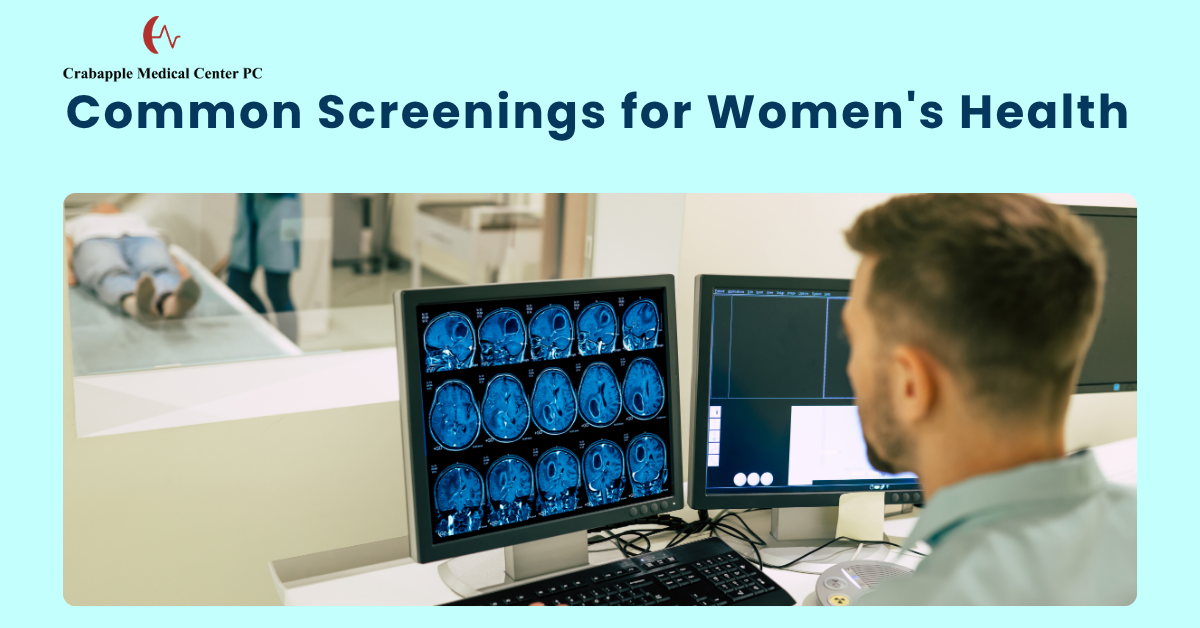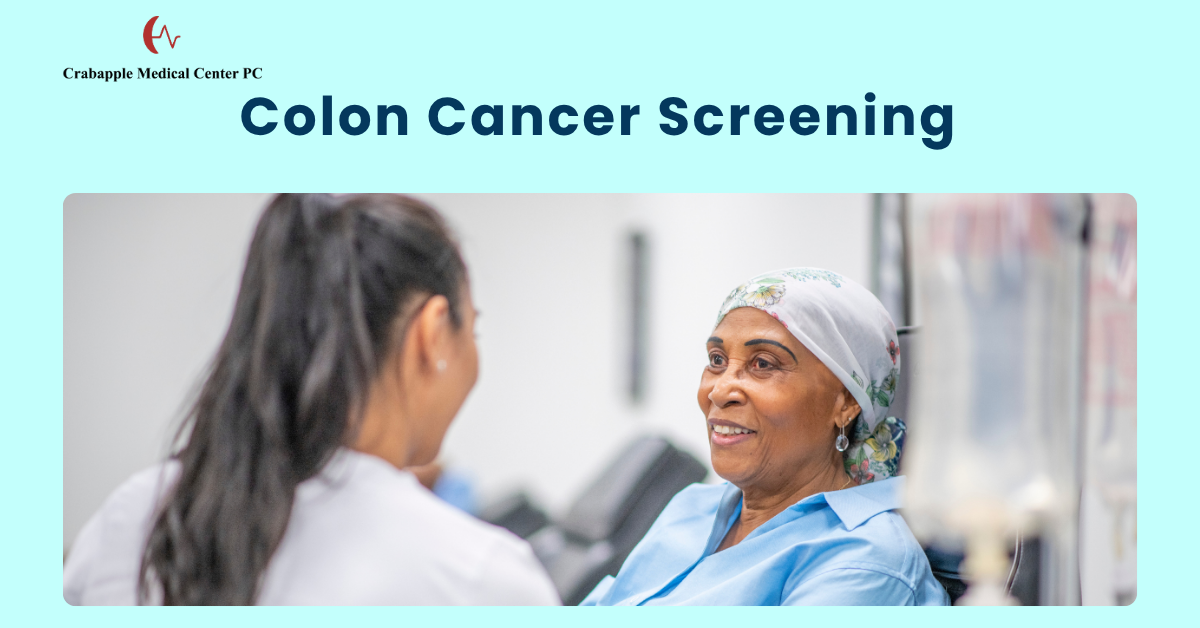Importance of Regular Screenings in Women’s Health
Women’s health is a priority that cannot be overlooked, especially when it comes to preventive care. In a world where medical advancements continue to evolve, one of the most effective ways to stay on top of your health is by scheduling regular health screenings. These screenings help detect potential health problems early, giving you a better chance of effective treatment and better outcomes. Regular screenings also provide women with peace of mind and ensure they are doing everything they can to live a long, healthy life.
This blog aims to shed light on the importance of regular screenings in women’s health. We’ll discuss the different types of screenings women should undergo at various life stages, why they matter, and how they contribute to a healthier future.
Why Regular Screenings Matter?
Regular health screenings are essential for the early detection of conditions that can otherwise go unnoticed until they become severe. Many health conditions, like high blood pressure, high cholesterol, or certain cancers, often don’t show symptoms in their early stages. This makes screenings critical for identifying these issues before they escalate.
Prevention:
Screenings offer an opportunity to prevent diseases before they even start. Early detection means that issues can be treated before they develop into life-threatening conditions. For example, a routine mammogram can detect breast cancer at an early, treatable stage, while a Pap smear can catch cervical cancer before it becomes advanced.
Detection of Asymptomatic Conditions:
Conditions like diabetes, high cholesterol, and hypertension may not show noticeable symptoms until complications arise. Regular screenings allow for these issues to be caught early, helping prevent future heart attacks, strokes, and other severe complications.
Peace of Mind:
The mental and emotional benefits of having regular screenings cannot be overstated. Many women experience anxiety about their health, but by staying on top of regular check-ups, they can reduce that anxiety and focus on living healthier lives, knowing they’re preventing potential health issues.

Common Screenings for Women’s Health
There are several types of screenings that women should undergo to maintain their health. Each one serves a different purpose, targeting specific risks that women face as they age. Here are the most important screenings every woman should consider:
1. Breast Cancer Screening (Mammograms)
Breast cancer is one of the most common cancers among women, making mammograms a crucial part of regular screenings.
Age Guidelines : It is generally recommended that women start having mammograms at age 40 and continue every year or two, depending on their risk factors. Women with a family history of breast cancer or who have genetic risk factors may need to start screening earlier.
Importance : Mammograms can detect lumps or abnormal tissue in the breasts that may indicate cancer, even before any symptoms appear. Early detection is critical for successful treatment and better prognosis.
2. Cervical Cancer Screening (Pap Smear and HPV Test)
Cervical cancer can often be prevented with early detection. Pap smears are used to identify abnormal cells that could develop into cervical cancer.
Recommended Age : Women should start getting Pap smears at age 21, with screenings every three years. For women over 30, an HPV test may be done alongside the Pap smear, which can help detect high-risk strains of the human papillomavirus (HPV), the main cause of cervical cancer.
Importance : By identifying abnormal cells early, a Pap smear can prevent the development of cervical cancer and save lives. Additionally, HPV vaccination is a powerful tool in preventing cervical cancer.
3. Osteoporosis Screening (Bone Density Test)
As women age, they become more susceptible to osteoporosis, a condition where bones become fragile and prone to fractures. A bone density test helps identify osteoporosis early, allowing women to take preventive measures.
Who Should Be Screened : Women over 65 or those at higher risk due to factors like family history, low calcium intake, or certain medications should get a bone density test.
Importance : Osteoporosis often has no symptoms until a fracture occurs. Regular screenings help women act before the condition causes significant harm.
4. Cardiovascular Health Screenings
Cardiovascular disease is the leading cause of death among women. Routine screenings for blood pressure, cholesterol levels, and other heart disease indicators are essential for reducing the risk of heart attacks and strokes.
Risk Factors : Age, family history, smoking, and a sedentary lifestyle can increase the risk of heart disease. Women should begin cardiovascular screenings starting at age 20 and have them checked regularly thereafter.
Importance : Heart disease can often go undiagnosed because symptoms, like chest pain or shortness of breath, may not appear until an emergency occurs. Regular screenings allow women to address risk factors like high cholesterol or hypertension early.
5. Diabetes Screening
Diabetes is becoming increasingly common among women, particularly with the rise of obesity and sedentary lifestyles. Screening for diabetes is essential for identifying the condition early and managing it effectively.
Who Needs It : Women aged 45 and older, or those with risk factors such as obesity or a family history of diabetes, should be tested regularly.
How It’s Done : Blood sugar levels are checked through simple tests like the fasting blood glucose test or the HbA1c test, which provides an average of your blood sugar levels over the past three months.
6. Colon Cancer Screening
Colon cancer is another major concern for women, especially as they reach their 50s. Colonoscopies and other tests help detect abnormalities in the colon that could lead to cancer.
When to Start : Screening generally starts at age 45 for individuals with average risk, though those with a family history of colon cancer may need to start earlier.
Types of Tests : Colonoscopy is the most common method for detecting colon cancer. Other tests include stool tests and sigmoidoscopy.

When Should Women Start Regular Screenings?
The timing of screenings can vary based on age, lifestyle, and risk factors. Here’s a general guide:
- Under 30 : Routine screenings may not be necessary unless you have specific risk factors like family history or symptoms.
- 30-40 : Begin mammograms at age 40, and start regular cervical screenings (Pap smear and HPV test) at age 21.
- 40-50 : Continue regular mammograms, cervical screenings, and begin cardiovascular health assessments.
- 50 and Beyond : Colon cancer screenings should begin at age 45, and osteoporosis screenings should start after menopause, along with other health assessments.
Role of Healthcare Providers in Women’s Health Screenings
Healthcare providers play an essential role in guiding women through regular screenings. They assess personal and family health history to determine when to begin screenings and how frequently they should be done. Regular checkups and discussions with your healthcare provider are essential to maintaining a proactive approach to health.
Screening Myths and Misconceptions
Despite their importance, there are several myths surrounding health screenings that may discourage women from getting them.
- Fear of Bad Results : While it’s natural to fear the results of a screening, it’s important to remember that early detection can lead to more effective treatments and better outcomes.
- Cost : Many insurance plans cover screenings, and the long-term savings from catching health issues early far outweigh the initial costs.
- Effectiveness : Some women believe screenings are unnecessary if they feel fine, but many serious health conditions don’t show symptoms until they’re advanced.
How to Prepare for Screenings and What to Expect
Preparing for screenings varies depending on the type, but some general tips include:
- Fasting : Some screenings, like cholesterol or blood sugar tests, require fasting beforehand.
- Timing : Mammograms are best scheduled when you’re not menstruating, and Pap smears should be done when you’re not using vaginal creams or medications.
- Post-Screening Follow-up : If the results are abnormal, don’t panic. Discuss the next steps with your healthcare provider.
A Healthier Tomorrow Starts with Screenings Today
Regular screenings are essential to women’s health. They allow for the early detection of life-threatening conditions, enable preventive care, and provide peace of mind. By staying on top of these screenings, you’re taking proactive steps toward a healthier and longer life. Schedule your next screening today at Crabapple Medical Center to ensure you’re prioritizing your health and well-being.
Frequently Asked Questions
Why are regular health screenings important for women?
Why are regular health screenings important for women?
How often should I get screened for breast cancer?
Most women should start getting mammograms at age 40 and continue every 1-2 years, depending on their risk factors and the advice of their healthcare provider.
Do I need to get a Pap smear if I’m not sexually active?
Yes, women should begin Pap smears at age 21, even if they are not sexually active. The test checks for abnormal cells that could lead to cervical cancer, which can develop regardless of sexual activity.
What should I expect during a bone density test?
A bone density test, also known as a DEXA scan, is a quick, non-invasive procedure that measures the density of your bones. You’ll lie on a table while a machine scans your bones. It’s painless and takes only about 10-15 minutes.
Are heart disease screenings necessary for young women?
Yes, heart disease screenings are important even for young women, especially if you have risk factors such as high cholesterol, high blood pressure, or a family history of heart disease. Early detection of risk factors allows for timely intervention and prevention.
How do I prepare for a diabetes screening?
For most diabetes screenings, you may need to fast for at least 8 hours before the test. This ensures an accurate reading of your blood sugar levels. Be sure to follow your healthcare provider’s specific instructions.
How can I schedule my screenings at Crabapple Medical Center?
Scheduling screenings is easy! You can contact Crabapple Medical Center directly through their website or call to make an appointment. You can also speak with your primary care provider for recommendations on which screenings you should undergo.
What happens if my screening results are abnormal?
If your screening results are abnormal, your healthcare provider will guide you through the next steps. This may involve additional testing or treatment. It’s important to stay calm and follow your provider’s advice to manage any potential health concerns.
How can I ensure I’m getting the right screenings for my age and health history?
Your healthcare provider is your best resource for determining which screenings are right for you. They will assess your age, family history, lifestyle factors, and any symptoms you may have to recommend the appropriate screenings and their frequency.
Can I get all my screenings done at once?
Many women opt for an annual check-up where they can have multiple screenings done in one visit, such as breast cancer screenings, blood pressure checks, and blood tests. Check with Crabapple Medical Center to see if they offer comprehensive screening packages for women.

